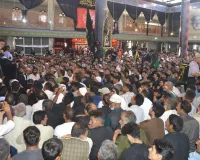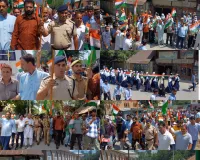Former Revenue Official Sentenced to 3.5 Years in 17-Year-Old Bribery Case
HT NEWS DESK

Pulwama, J&K – August 18, 2025 – After a legal battle spanning over 17 years, the Special Judge Anti-Corruption Court in Pulwama today convicted a former Girdawar (revenue official), Ghulam Hassan Kumar, for demanding and accepting a bribe of ₹2,000 for the demarcation of land in 2008.
Special Judge Dr. Noor Mohammad Mir sentenced Kumar to three and a half years of simple imprisonment and imposed a total fine of ₹30,000. In a strongly worded judgment, the court described corruption as a “malignant affliction that strikes at the very foundation of a democratic polity and the rule of law.”
The case dates back to June 16, 2008, when Mohammad Yousuf Mir of Shopian lodged a complaint with the Vigilance Organization Kashmir (VOK), now the Anti-Corruption Bureau (ACB). Mir alleged that Kumar, the then Girdawar of Circle Kegam, Shopian, had demanded ₹2,000 to demarcate a plot of land measuring 18 Kanal and 18 Marlas.
Acting on the complaint, the VOK laid a trap. The currency notes provided by the complainant were treated with Phenolphthalein powder and a trap team was constituted, which included an independent witness from the Commercial Taxes Department.
The team caught Kumar red-handed accepting the tainted money at the private office of a local Patwari in Sindu Shirmal, Shopian. The ₹2,000 was recovered from the back pocket of the trousers he was wearing. Subsequent chemical tests of his hand wash and the pocket wash turned positive, confirming his contact with the treated currency notes.
During the extensive trial, the prosecution examined twelve witnesses. The complainant, Mohammad Yousuf Mir (PW1), gave a detailed account of the demand and acceptance of the bribe during his initial testimony. However, during cross-examination, he made some concessions towards the accused. The court noted that his statement recorded under Section 164-A of the Criminal Procedure Code (Cr.PC) before a magistrate was consistent with the prosecution’s case and remained unimpeached.
The defense argued that the money was thrusted into Kumar’s hand and produced two witnesses to support this claim. However, the court found their presence at the scene improbable and their statements “ambiguous and inconsistent.”
In his judgment, Judge Dr. Noor Mohammad Mir observed that the prosecution had successfully proven the demand, acceptance, and recovery of the bribe beyond a reasonable doubt. The court dismissed minor contradictions in witness testimonies as natural and found the chain of evidence, including the positive FSL report and the recovery of the notes, to be unbroken.
”When a public servant entrusted with authority and resources for the welfare of people abuses that trust for personal gain it is not nearly a lapse in integrity, it is a betrayal of the constitution itself,” the court remarked.
Ghulam Hassan Kumar was convicted for offenses under Section 5(2) read with 5(1)(d) of the J&K Prevention of Corruption Act, Svt. 2006, and Section 161 of the Ranbir Penal Code (RPC).
Both sentences will run concurrently. Kumar, who was present in court, was taken into custody immediately to be sent to Central Jail, Srinagar, to serve his sentence.
In the judgment, the court has observed that, Corruption is a malignant affliction that strikes at the very foundation of a democratic polity and the rule of law. It is not a victimless crime. Its invisible wounds bleed the economy, erode public trust and subvert the moral fabric of the state. When a public servant entrusted with authority and resources for the welfare of people abuses that trust for personal gain it is not nearly a lapse in integrity, it is a betrayal of the constitution itself,” the court said.
The judgment continued by detailing the far-reaching consequences, noting that corruption “distorts governance, diverts public funds from developmental priorities and entrenches inequality.” The court observed that for the honest citizen, “corruption becomes an oppressive barrier, a toll exacted at every gate of opportunity, whether for securing a job, obtaining basic civic amenities or accessing justice.”
Highlighting the corrosive effect on society, the court stated that such acts send a message “that power is a commodity for sale and official duty is a tradable service,” which ultimately “erodes the legitimacy of public institutions” and “breeds cynicism among the governed.”
Finally, the court affirmed its own responsibility, stating that courts, as “guardians of the law bear the solemn duty of enforcing these mandates with firmness.” A resolute judicial response, it said, serves as a deterrent and affirms “to society that public office is a sacred trust not a private business.
The verdict was hailed by local residents, who praised the judiciary for its firm stance. Community members in the region expressed satisfaction with the outcome, viewing the conviction as a significant step towards ensuring accountability and transparency in public service. Many voiced hope that the judgment by Dr. Noor Mohammad Mir would serve as a strong deterrent against corruption in government offices.(KNB)













Comment List